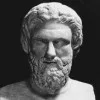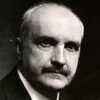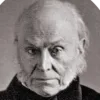ORESTES: Otherwise how can we believe in the gods, if injustice can triumph over justice?
[ὈΡΈΣΤΗΣ:ἢ χρὴ μηκέθ᾽ ἡγεῖσθαι θεούς,
εἰ τἄδικ᾽ ἔσται τῆς δίκης ὑπέρτερα.]Euripides (485?-406? BC) Greek tragic dramatist
Electra [Ἠλέκτρα], l. 584ff (c. 420 BC) [tr. Theodoridis (2006)]
(Source)
(Source (Greek)). Alternate translations:Else shall we cease to think that any Gods
Exist, if Villainy prevail o'er Justice.
[tr. Wodhull (1809); Electra speaking]Else we must no longer believe in gods, if wrong is to be victorious over right.
[tr. Coleridge (1891)]It behooves one no longer to think that there are Gods, if unjust deeds get the advantage of justice.
[tr. Buckley (1892)]We must believe no more
In Gods, if wrong shall triumph over right.
[tr. Way (1896)]Else men shall know there is no God, no light
In Heaven, if wrong to the end shall conquer right.
[tr. Murray (1905)]Else must we cease to believe in gods, if wrong is to triumph o'er right.
[tr. Coleridge (1938 ed.)]For if wrongful acts
triumph over justice, then no longer
should we put any of our faith in gods.
[tr. Johnston (2009), l. 699ff]
Quotations about:
right
Note not all quotations have been tagged, so Search may find additional quotes on this topic.
Never let your sense of morals prevent you from doing what is right!
Isaac Asimov (1920-1992) Russian-American author, polymath, biochemist
Foundation, Part 4 “The Traders,” ch. 1, epigraph (1951)
(Source)
Motto of Salvor Hardin, as mentioned in the "Traders" entry in the Encyclopedia Galactica.
This part of the book was originally published as "The Wedge," Astounding Science-Fiction (1944-10), where the Salvor Hardin quote alone appears as the epigraph.
Morality is the theory that every human act must be either right or wrong, and that 99 per cent. of them are wrong.
H. L. Mencken (1880-1956) American writer and journalist [Henry Lewis Mencken]
A Little Book in C Major, ch. 2, § 4 (1916)
(Source)
Variants:MORALITY. The theory that every human act must be either right or wrong, and that 99% of them are wrong.
[A Book of Burlesques, "The Jazz Webster" (1924)]Morality is the theory that every human act must be either right or wrong, and that 99% of them are wrong.
[Chrestomathy, ch. 30 "Sententiae" (1949)]
We cannot, by total reliance on law, escape the duty to judge right and wrong [….] There are good laws and there are occasionally bad laws, and it conforms to the highest traditions of a free society to offer resistance to bad laws, and to disobey them.
Alexander M. Bickel (1924-1974) Romanian-American law professor, constitutional scholar
Politics and the Warren Court, Part 3, ch. 5 “Civil Rights and Civil Disobedience” (1965)
(Source)
Even when you are right, it is good to make concessions: people will recognize you were right but admire your courtesy. More is lost through holding on than can be won by defeating others. One defends not truth but rudeness.
[Aun en caso de evidencia, es ingenuidad el ceder, que no se ignora la razón que tuvo y se conoce la galantería que tiene. Más se pierde con el arrimamiento que se puede ganar con el vencimiento; no es defender la verdad, sino la grosería.]
Baltasar Gracián y Morales (1601-1658) Spanish Jesuit priest, writer, philosopher
The Art of Worldly Wisdom [Oráculo Manual y Arte de Prudencia], § 183 (1647) [tr. Maurer (1992)]
(Source)
(Source (Spanish)). Alternate translations:It is civil to yield, even in those things wherein we have greatest reason and certainty: for then all know, who had reason on their side: and besides the reason, Gallantry is also discovered in the procedure. There is more esteem lost, by a wilfull resistence, then there is got by carrying it by open force. For that is not so much a defending of truth, as a demonstration of Clownishness.
[Flesher ed. (1685)]Even in cases of obvious certainty it is fine to yield: our reasons for holding the view cannot escape notice, our courtesy in yielding must be the more recognised. Our obstinacy loses more than our victory yields: that is not to champion truth but rather rudeness.
[tr. Jacobs (1892)]Even with the proof on your side, it is well to make concession, for your reasons are known and your gentlemanliness is recognized; more is lost in contention than can be gained in consummation, for such does not defend the truth, but only exhibits bad manners.
[tr. Fischer (1937)]
By Hercules, I prefer to be wrong with Plato … than to be right with those idiots.
[Errare mehercule malo cum Platone … quam cum istis vera sentire.]
Marcus Tullius Cicero (106-43 BC) Roman orator, statesman, philosopher
Tusculan Disputations [Tusculanae Disputationes], Book 1, ch. 17 (1.17) / sec. 39 [Auditor] (45 BC) [tr. @sententiq (2012)]
(Source)
Original Latin. Alternate translations:
- "Had rather, I assure you, be mistaken with Plato ... than to be of their opinion in the right." [tr. Wase (1643)]
- "I had rather, so help me Hercules, be mistaken with Plato ... than be in the right with them." [tr. Main (1824)]
- "I would rather err, by Hercules, with Plato ... than to embrace the truth with those others." [tr. Otis (1839)]
- "I had rather, so help me Hercules! be mistaken with Plato ... than be in the right with those others." [tr. Yonge (1853)]
- "I would rather, by Hercules, err with Plato ... than hold the truth with those other philosophers." [tr. Peabody (1886)]
- "I would rather, so help me Hercules! be wrong with Plato ... than be right with all the rest of them." [tr. Black (1889)]
- "Believe me, I'd rather go wrong in the company of Plato ... than hold the right views with his opponents." [tr. Davie (2017)]
If we merge mercy with might,
and might with right,
then love becomes our legacy
and change our children’s birthright.Amanda Gorman (b. 1998) American poet and activist
“The Hill We Climb” (2021)
(Source)
Read at the Presidential Inauguration (20 Jan 2021).
From such Considerations as these it follows, that I ought never to be angry with any one for differing in Judgment from me. For how know I but the Point in dispute between us, is one of those Errors that I have embrac’d as Truth. If I am in the Wrong, I should not be displeas’d that another is in the Right. If I am in the Right, ’tis my Happiness; and I should rather pity than blame him who is unfortunately in the Wrong.
Benjamin Franklin (1706-1790) American statesman, scientist, philosopher, aphorist
Letter to Josiah Franklin (Apr 1738) [draft]
(Source)
His father.
It says in the Constitution that we all have a guaranteed right to make fools of ourselves. I have taken every chance to reap the rewards of that guarantee. If forced to action, I mean to fight to defend that right, which includes the right to be wrong, queer, or just kooky. And how can I defend that unless I defend those kooks and queers who think (wrongly, of course) that I am kooky and queer?
John Ciardi (1916-1986) American poet, writer, critic
In Vince Clemente, “‘A Man Is What He Does With His Attention’: A Conversation with John Ciardi,” Poesis, Vol. 7 #2 (1986)
(Source)
So oft as I with state of present time
The image of the antique world compare,
Whereas man’s age was in his freshest prime,
And the first blossom of faire vertue bare,
Such oddes I find twixt those and these which arc,
As that, through long continuance of his course,
Me seemes the world is runne quite out of square
From the first point of his appointed source;
And being once amiss, grows daily worse and worse: […]For that which all men then did vertue call,
Is now cald vice; and that which vice was hight,
Is now hight vertue, and so us’d of all;
Right now is wrong, and wrong that was is right.Edmund Spenser (c. 1552-1599) English poet
The Faerie Queene, Book 5, Proem, st. 1, 4 (1589-96)
(Source)
There is no accepted test of civilization. It is not wealth, or the degree of comfort, or the average duration of life, or the increase of knowledge. All such tests would be disputed. In default of any other measure, may it not be suggested that as good a measure as any is the degree to which justice is carried out, the degree to which men are sensitive as to wrong-doing and desirous to right it? If that be the test, a trial such as that of Servetus is a trial of the people among whom it takes place, and his condemnation is theirs also.
John Macdonell (1846-1921) British jurist
Historical Trials, ch. 7 (1927)
(Source)
John Calvin ordered Michael Servetus be imprisoned for heresy in Geneva; he was tried, then burned at the stake in 1553.
Even a stopped clock is right twice every day. After some years, it can boast of a long series of successes.
[Die still stehende Uhr, die täglich zwei Mal die richtige Zeit angezeigt hat, blickt nach Jahren auf eine lange Reihe von Erfolgen zurück.]
DICAEPOLIS: Comedy too can sometimes discern what is right. I shall not please, but I shall say what is true.
Aristophanes (c. 450-c. 388 BC) Athenian comedic playwright
Acharnians, ll. 500-501 (425 BC) [tr. Athenian Society (1912)]
(Source)
Maturity begins when we’re content to feel we’re right about something without feeling the necessity to prove someone else wrong.
Sydney J. Harris (1917-1986) Anglo-American columnist, journalist, author
(Attributed)
Frequently attributed to Harris, but the original source has not been found. Earliest citation I could find was in Reader's Digest (1973), where it is further credited to the Publishers-Hall Syndicate.
I have changed my definition of tragedy. I now think tragedy is not foul deeds done to a person (usually noble in some manner) but rather that tragedy is irresolvable conflict. Both sides/ideas are right.
Rita Mae Brown (b. 1944) American author, playwright
Starting from Scratch, Part 3 “The Work,” “Plot” (1989)
(Source)
A right should not be absolute for the same reason that a power should not be absolute.
R. H. Tawney (1880-1962) English writer, economist, historian, social critic [Richard Henry Tawney]
The Acquisitive Century, ch. 4 “The Nemesis of Industrialism” (1920)
(Source)
See Lord Acton.
Do what you think is right and to hell with your popularity.
Brian Mulroney (b. 1939) Canadian politician, Prime Minister (1984-93)
Remark to US President Bill Clinton (2 Jun 1993)
(Source)
Quoted by Mulroney in a press conference.
The probability that we may fall in the struggle ought not deter us from the support of a cause we believe to be just; it shall not deter me.
No matter how dull, or how mean, or how wise a man is, he feels that happiness is his indisputable right.
To keep your marriage brimming,
With love in the loving cup,
Whenever you’re wrong, admit it;
Whenever you’re right, shut up.Ogden Nash (1902-1971) American poet
“A Word to Husbands,” Marriage Lines: Notes of a Student Husband (1964)
(Source)
When you are right you cannot be too radical; when you are wrong, you cannot be too conservative.
Martin Luther King, Jr. (1929-1968) American clergyman, civil rights leader, social activist, preacher
(Misttributed)
(Source)
Often attributed directly to King, he prefaced it, in Why We Can't Wait (1964), with "Someone once wrote ..."
The greatest enemy of justice is privilege.
[Der größte Feind des Rechtes ist das Vorrecht.]
Marie von Ebner-Eschenbach (1830-1916) Austrian writer
Aphorisms [Aphorismen], No. 219 (1880) [tr. Scrase/Mieder (1994)]
(Source)
(Source (German)). Alternate translation:The greatest enemy of the law of right is the law of prerogative.
[tr. Wister (1883)]
On some positions, Cowardice asks the question, “Is it safe?” Expediency asks the question, “Is it is politic?” Vanity asks the question, “Is it is popular?” But Conscience asks the question, “Is it right?” There comes a time when one must take a position that is neither safe, nor politic, nor popular, but he must do it because Conscience tells him it is right.
Martin Luther King, Jr. (1929-1968) American clergyman, civil rights leader, social activist, preacher
Speech, Santa Rita, Calif., (14 Jan 1968)
Recording (at 10:22). King reused speech elements frequently. The same passage can be found in "Remaining Awake Through a Great Revolution", sermon at the National Cathedral, Washington, DC (31 Mar 1968).
To this war of every man against every man, this also is consequent; that nothing can be unjust. The notions of right and wrong, justice and injustice, have there no place. Where there is no common power, there is no law; where no law, no injustice. Force and fraud are in war the two cardinal virtues.
DREAM: It is a fool’s prerogative to utter truths that no one else will speak.
Neil Gaiman (b. 1960) British author, screenwriter, fabulist
Sandman, Book 3. Dream Country, # 19 “A Midsummer Night’s Dream” (1990)
(Source)
Because the story includes William Shakespeare as a character, and is named after Shakespeare's play (which is performed in the story), this line is sometimes misattributed to Shakespeare himself.
See also this later comment by Dream.
Vanity asks the question — is it popular? Conscience asks the question — is it right?
Martin Luther King, Jr. (1929-1968) American clergyman, civil rights leader, social activist, preacher
Sermon, Passion Sunday, National Cathedral, Washington, DC (31 Mar 1968)
See also this.
We will have to repent in this generation not merely for the vitriolic words and actions of the bad people, but for the appalling silence of the good people. We must come to see that human progress never rolls in on wheels of inevitability. It comes through the tireless efforts and persistent work of men willing to be co-workers with God, and without this hard work time itself becomes an ally of the forces of social stagnation. We must use time creatively, and forever realize that the time is always ripe to do right.
Martin Luther King, Jr. (1929-1968) American clergyman, civil rights leader, social activist, preacher
Letter from Birmingham Jail (16 Apr 1963)
(Source)
“My Country, right or wrong” is a thing no patriot would think of saying except in a desperate case. It is like saying, “My mother, drunk or sober.”
Gilbert Keith Chesterton (1874-1936) English journalist and writer
The Defendant, ch. 16 “A Defence of Patriotism”
(Source)
I cannot ask of Heaven success, even for my Country, in a Cause where she should be in the wrong — Fiat Justitia, pereat Coelum — My toast would be, may our Country be always successful, but whether successful or otherwise, always right.
John Quincy Adams (1767-1848) US President (1825-29)
Letter (1816-08-01) to John Adams
(Source)
In response to Stephen Decatur's toast (and subsequent popular catch phrase), "Our Country! In her intercourse with foreign nations may she always be in the right, but our country, right or wrong."
The Latin translates as "Let justice be done though Heaven should fall."
































